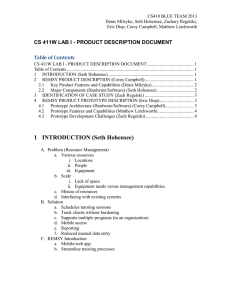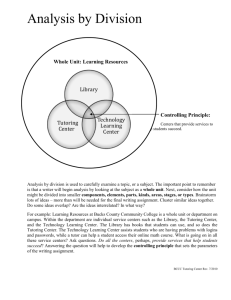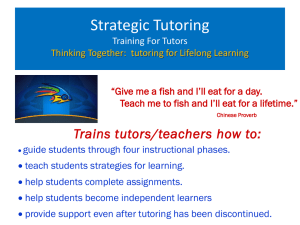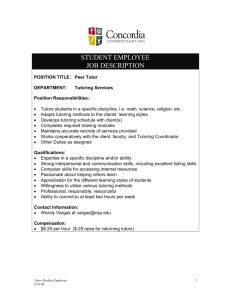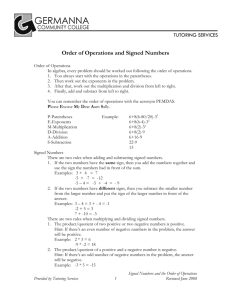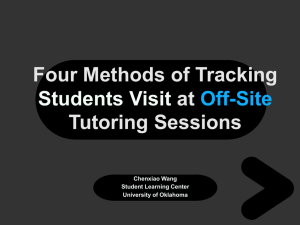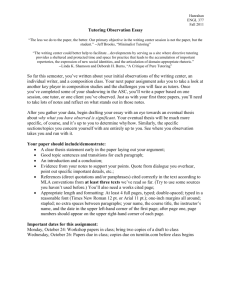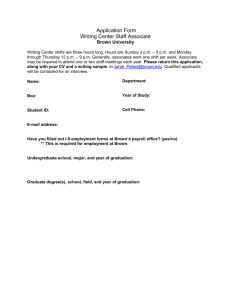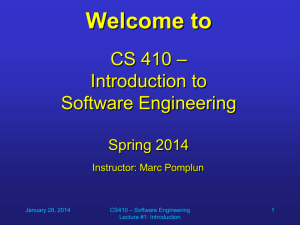cs 411w product description document format
advertisement
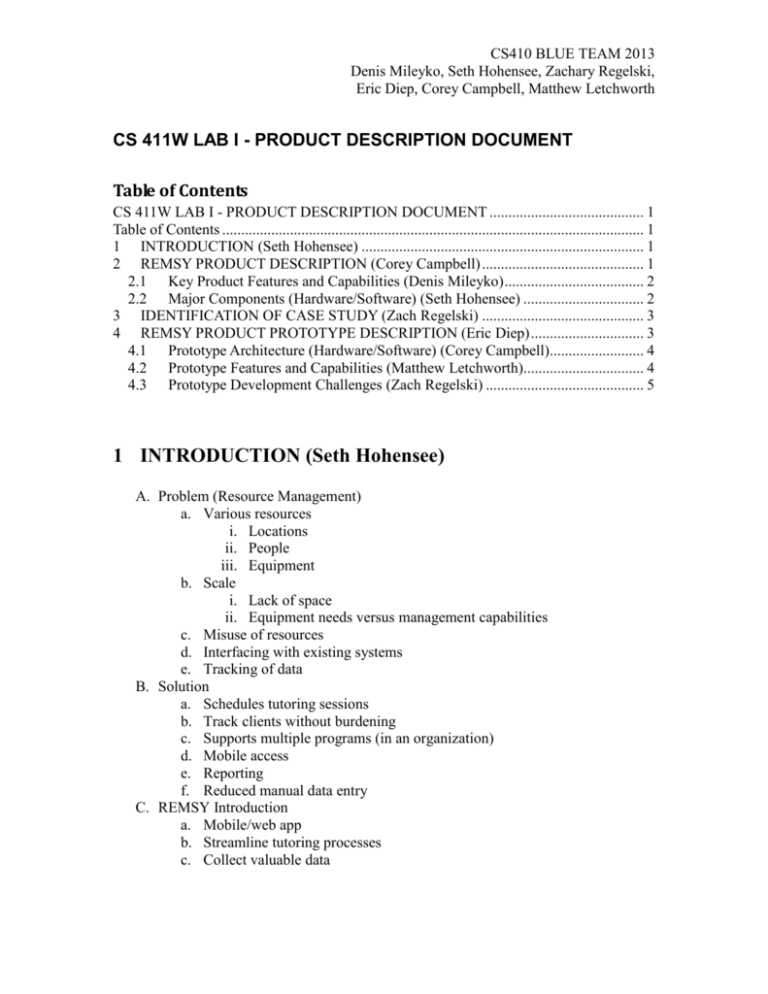
CS410 BLUE TEAM 2013 Denis Mileyko, Seth Hohensee, Zachary Regelski, Eric Diep, Corey Campbell, Matthew Letchworth CS 411W LAB I - PRODUCT DESCRIPTION DOCUMENT Table of Contents CS 411W LAB I - PRODUCT DESCRIPTION DOCUMENT ......................................... 1 Table of Contents ................................................................................................................ 1 1 INTRODUCTION (Seth Hohensee) ........................................................................... 1 2 REMSY PRODUCT DESCRIPTION (Corey Campbell) ........................................... 1 2.1 Key Product Features and Capabilities (Denis Mileyko) ..................................... 2 2.2 Major Components (Hardware/Software) (Seth Hohensee) ................................ 2 3 IDENTIFICATION OF CASE STUDY (Zach Regelski) ........................................... 3 4 REMSY PRODUCT PROTOTYPE DESCRIPTION (Eric Diep) .............................. 3 4.1 Prototype Architecture (Hardware/Software) (Corey Campbell)......................... 4 4.2 Prototype Features and Capabilities (Matthew Letchworth)................................ 4 4.3 Prototype Development Challenges (Zach Regelski) .......................................... 5 1 INTRODUCTION (Seth Hohensee) A. Problem (Resource Management) a. Various resources i. Locations ii. People iii. Equipment b. Scale i. Lack of space ii. Equipment needs versus management capabilities c. Misuse of resources d. Interfacing with existing systems e. Tracking of data B. Solution a. Schedules tutoring sessions b. Track clients without burdening c. Supports multiple programs (in an organization) d. Mobile access e. Reporting f. Reduced manual data entry C. REMSY Introduction a. Mobile/web app b. Streamline tutoring processes c. Collect valuable data CS410 BLUE TEAM 2013 Denis Mileyko, Seth Hohensee, Zachary Regelski, Eric Diep, Corey Campbell, Matthew Letchworth 2 REMSY PRODUCT DESCRIPTION (Corey Campbell) A. Resource management system apparatus a. Web portal b. Mobile app c. Servers d. Notifications B. Standard tutoring interface a. TutorTrac helper b. Uniform university application for departments C. Centralized data aggregation for reporting a. Student b. Tutor c. Resources D. Customizable roles E. Advantageous tutoring resolution a. Mobility b. Freelance tutors c. Increased communication platform 2.1 Key Product Features and Capabilities (Denis Mileyko) A. B. C. D. E. F. G. H. I. J. K. L. M. N. O. P. Web portal as well as mobile application Native support for card/code reading Tracks statistics for administrative report generation Monitors student turn away Allows for user driven study groups/mentoring Uses student information to streamline sign-up Supports multiple programs and administrators within the same instance Allows students to apply to tutor classes Application requirements based on program templates Allows for verification methods based on the tutor, the student, or both Email, SMS, and App based alerts Alerts the student/tutor if their session is not closed Customizable roles and permissions Secure session logging 508 Compliant FERPA Compliant 2.2 Major Components (Hardware/Software) (Seth Hohensee) A. RWP MFCD B. Hardware a. Database Server CS410 BLUE TEAM 2013 Denis Mileyko, Seth Hohensee, Zachary Regelski, Eric Diep, Corey Campbell, Matthew Letchworth b. Web Server c. Student (possibly University) mobile devices C. Software a. Web(Apache) b. Database(MySQL) c. Mobile App (Multi-platform) d. Reporting e. External Authentication f. External Database (such as Banner, TutorTrac) g. External Mail Server 3 IDENTIFICATION OF CASE STUDY (Zach Regelski) A. Tutoring Center a. Diverse departments b. Multiple standards c. Locations d. PEP B. TutorTrac a. Purpose b. Online System c. Card readers d. Faults e. Mobile functionality C. Marissa Jimenez a. Mentor - one of the current implementers and overseers of the tutoring center b. The tutoring center could use more digital optimization and regulation D. Jeffrey Turner a. Mentor - TutorTrac implementation and integration specialist b. The tutoring center could use more availability and functionality 4 REMSY PRODUCT PROTOTYPE DESCRIPTION (Eric Diep) A. Prototype will include a. REMSY configuration b. Optimized database c. Web application i. Aesthetics d. Mobile application i. Aesthetics e. FERPA compliance f. REMSY test system g. 508 compliance CS410 BLUE TEAM 2013 Denis Mileyko, Seth Hohensee, Zachary Regelski, Eric Diep, Corey Campbell, Matthew Letchworth 4.1 Prototype Architecture (Hardware/Software) (Corey Campbell) A. Hardware a. Desktop machine b. Mobile i. Tablets ii. Smartphones c. Servers i. Web ii. ODU Mail iii. Database iv. Banner Model v. Authentication (Shibboleth Model) B. Software a. Web b. TutorTrac helper c. MySQL databases i. REMSY ii. TutorTrac d. Mobile applications i. Android ii. iOS e. Testing i. Dashboard ii. User accounts iii. Mock data 1. Administrator 2. Manager 3. Student 4. Tutor 4.2 Prototype Features and Capabilities (Matthew Letchworth) A Basic User Features a Web Access i Login ii Schedule Appointments iii Manage Appointments b Mobile App i Log in ii Schedule Appointments iii Manage Appointments iv Session Check In B Advance Features a Database Control b Card-reader integration(optional) c Web Security d e f CS410 BLUE TEAM 2013 Denis Mileyko, Seth Hohensee, Zachary Regelski, Eric Diep, Corey Campbell, Matthew Letchworth Web/Mobile ease-of-use Assess Turn-Aways i Tracks interest in unavailable subjects ii Determines if a tutor in these subjects is necessary Basic Tracking of Tutoring Appointment Information 4.3 Prototype Development Challenges (Zach Regelski) A. Database a. Data integrity b. Data security c. Interacting with the Mail Server d. Algorithms e. Data Cooperation B. Mail Server a. Using the Database C. User Interface a. Cleanliness b. Glitch free c. Effective, not just serviceable D. Risks a. Customer Risks i. Lack of university-wide adoption ii. Transition to a new process flow b. Technical Risks i. Availability of mobile device and computers ii. Ability to integrate with university database iii. Hardware and software upgrades iv. Confidential information security v. Usability and version control vi. Abuse of system Glossary References
